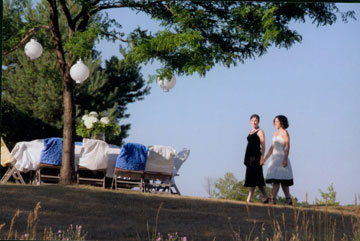My (Jewish-Interfaith-Lesbian) Wedding
Permanent link All Posts

The couple relaxing before everyone arrives on the big day
Change is possible. When I first came out to my grandmother, she told me that she was okay with it, but didn’t agree with gay marriage. Several years later, this same grandmother actually hosted our wedding at her home.
At our wedding, there were those who refused to call it a wedding. Relatives with George W. Bush bumper stickers parked next to friends counting down to the end of his reign. There were Christians, Jews, Buddhists and those embracing their own self-defined spirituality or none at all. Some guests came who only speak the words “lesbian” or “gay” in whispers—and only when they find themselves unable to avoid it altogether—while other friends and family who embrace our relationship wrote heartfelt blessings for us as part of our ceremony.
Mandi and I started dating in college when we were both 20 and quickly became inseparable. After being completely in love for five years, she proposed. We spent two years planning our wedding—partly to take our time and enjoy the process, partly because July 2007 had a good ring to it and partly to give our families time to get used to the idea.
People didn’t know how to respond to our decision to have a wedding. We had to listen to some say they didn’t agree with us. We only received one engagement present. We had to create a ceremony from scratch. We had to figure out how to respond to people who didn’t understand what we meant when we told them we were getting married. We dealt with the traditional drama of who to invite and not to invite. We spent loads of cash. Why were we doing this again?
For all of these reasons and more. Because creating our own ceremony gave me the opportunity to question which Jewish traditions were important to me and had meaning for both of us as an interfaith couple. Because through the entire process of planning and figuring out how to deal with some hard questions we grew more resilient as individuals and stronger as a couple. Because by being open about our love, we let people into our lives and allowed our families to embrace us in a way that didn’t seem possible before.
And because it was FUN! Because roasting s’mores over a bonfire and dancing with your closest friends and relatives in the middle of a meadow on a clear summer night creates the best memories. Because maybe we could help people leave their judgments in the past and open their minds to others who are different from themselves. Because despite everyone’s differences, there was not a dry eye at the end of our ceremony and I will never forget my grandmother hugging me afterward and saying, “You are such a good lesson for all of us.”
I know not everyone is open to learning these lessons. Mandi’s mom did not come to our wedding. She did not acknowledge the invitation we sent. She did not ask us about the preparations or to see the pictures afterward. She still does not see our relationship for what it is. There is no getting around how much that hurts, but there is nothing I can do to change it.
The best I can do is to continue caring about her and focusing on the good things she does bring into my life. We are all human beings, after all. In acknowledging this and being true to ourselves as individuals and as a couple, Mandi and I hope to help others to do the same.
In this small way, we are working together toward the promise we made at the end of our Ketubah: that together we will help build a world filled with peace and love. I cannot think of a better way to do this as an interfaith lesbian couple than to live every day openly, embracing differences and common humanity with kindness and compassion. I know this will not be an easy task, but my experience so far has shown me that facing the challenge is worth it.
One week after the big day, the very same grandmother who once voiced her opposition to gay marriage was excitedly suggesting sperm donors so we can start our family. Really, grandma, one thing at a time.



.jpg)



